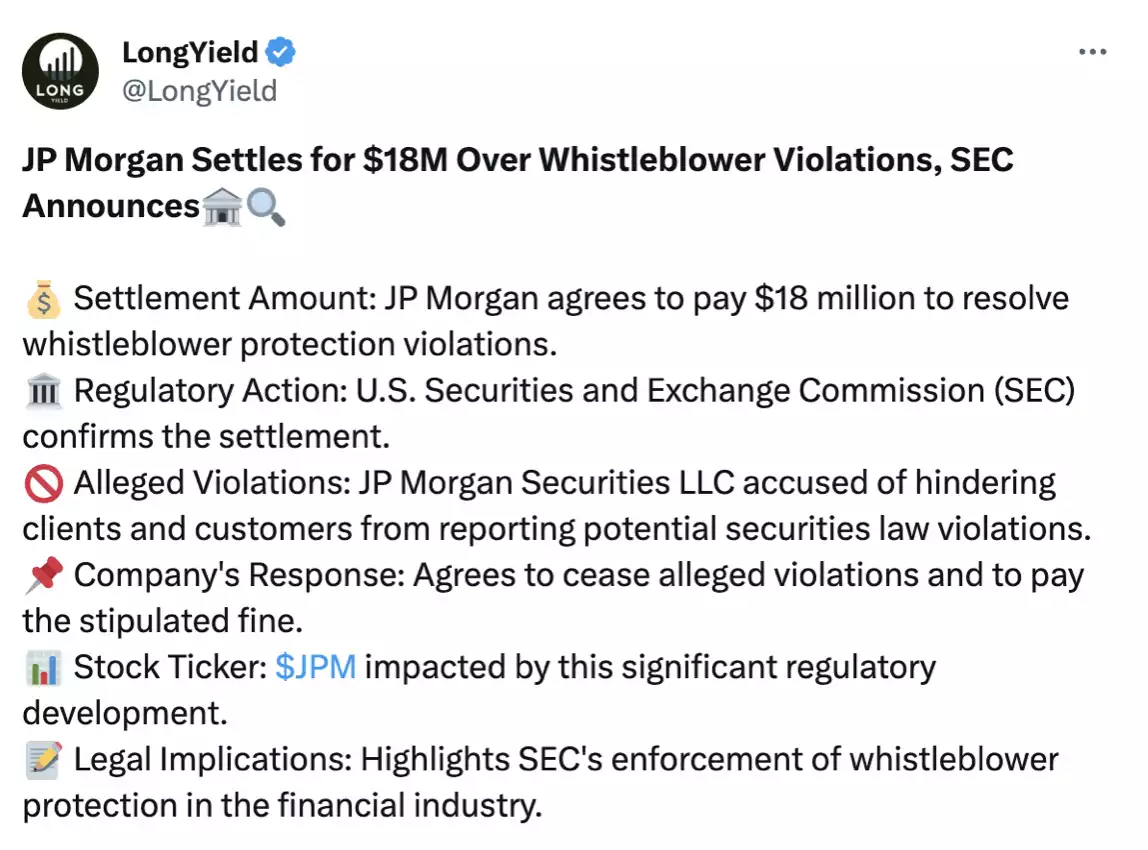Largest Bank in the World Just Caught Bribing its Clients
News
|
Posted 17/01/2024
|
2337
The Securities and Exchange Commission (SEC) announced this morning that they had settled charges with JP Morgan for preventing hundreds of advisory and brokerage clients from reporting potential securities law violations to the SEC. Of course, no guilt was officially admitted.
A week after the SEC's horrific handling of the Bitcoin ETF 'Twitter hack' debacle, they have somewhat redeemed themselves by exposing the extremely questionable practices at the one bank that is arguably the most important for the systematic financial stability of the US.
According to an SEC press release, JP Morgan regularly requested retail clients, from March 2020 to July 2023, to sign confidential release agreements if they received a credit or settlement exceeding $1,000 from the firm. These agreements compelled clients to maintain confidentiality regarding the settlement, its underlying facts, and information related to the concerned account. While clients were allowed to respond to SEC inquiries, they were prohibited from voluntarily contacting the SEC.

It was reported that 362 clients signed such release, with the amounts ranging from $1000 to $165,000
JP Morgan paid an $18 million fine to the U.S. Securities and Exchange Commission (SEC) without admitting or denying charges. Obviously, $18 million is pennies for JP Morgan, barely a slap on the wrist considering their standardised risk-weighted assets hit $1.7 trillion this year.
The SEC's Director of Enforcement, Gurbir S. Grewal, emphasised the illegality of including provisions preventing individuals from reporting wrongdoing to the SEC. He stated, "Whether it’s in your employment contracts, settlement agreements or elsewhere, you simply cannot include provisions that prevent individuals from contacting the SEC with evidence of wrongdoing."
Grewal continued: “But that’s exactly what we allege J.P. Morgan did here. For several years, it forced certain clients into the untenable position of choosing between receiving settlements or credits from the firm and reporting potential securities law violations to the SEC. This either-or proposition not only undermined critical investor protections and placed investors at risk, but was also illegal.”
Corey Schuster, Co-Chief of the Enforcement Division’s Asset Management Unit, also highlighted the importance of investors being free to report complaints to the SEC without interference, emphasising that this either-or proposition created by JP Morgan undermined investor protections and violated the law.
This revelation comes shortly after JP Morgan concluded what Bloomberg referred to as the most profitable year in US banking history, with a seventh consecutive quarter of record net interest income.
Even in the extremely profitable banking environment we witnessed in 2023, the largest bank in the world in terms of total assets under management had to resort to what is effectively bribing its clients from revealing skeletons in their closet. Not a positive sign for JP Morgan, and not a positive sign for the overall banking sector as a whole if this is what market its leader allegedly engages in.
There is no shortage of irony in JP Morgan himself famously quoted as saying:
“Money equals business which equals power, all of which come from character and trust.”
Trust is at the core of all financial assets and institutions. Just yesterday we discussed the move from the gold standard, a standard that instilled trust in the core global asset of “money”. By moving from gold to Fiat money, we introduced trust into money and of course counterparty risk. Gold has zero counterparty risk. It is no one’s liability.
JP Morgan himself also famously said:
“A man generally has two reasons for doing a thing. One that sounds good, and a real one.”
And importantly in his testimony before Congress in 1912, JP Morgan also stated,
“Gold is money. Everything else is credit.”
How little did he know how extended that “credit” would become (Exhibit A – World Debt $310 trillion) nor how much his bank would betray that “trust” to “sound good”…..